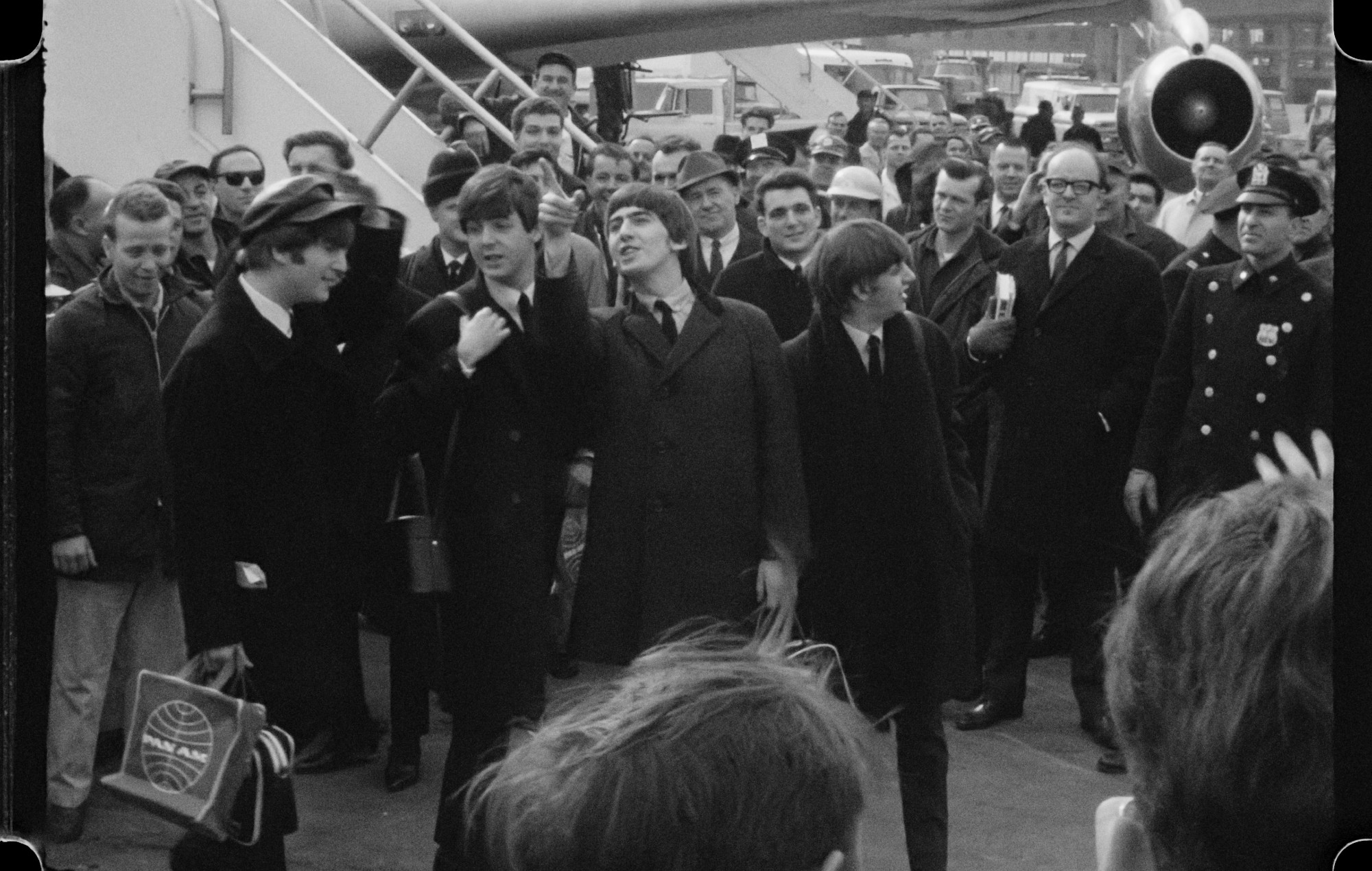Beatles ’64 director David Tedeschi has spoken to NME about the upcoming, Martin Scorsese-produced documentary on the Fab Four, which explores the band’s culture-shifting three-week trip to America in the titular year. The new film will be available to stream from November 29, but we can exclusively share the first trailer below.
READ MORE: The Beatles: every song ranked in order of greatness
The documentary features rare, newly restored 4K footage of the band originally shot by the filmmakers Albert and David Maysles for the 1964 documentary What’s Happening! The Beatles In The U.S.A. Tedeschi, who was an editor on Scorsese’s Rolling Stones documentary Shine A Light and George Harrison: Living In A Material World, also bagged new interviews with Paul McCartney, Ringo Starr and fans who greeted the lads after their arrival in New York.
In a wide-ranging chat, Tedeschi discussed the parallels between our own divided world and that of 1964, the band’s interpersonal relationships and his work with Scorsese. He also noted of the aforementioned fans: “It was such a visceral experience that they didn’t know how to put it into words – that’s why they screamed, you know?”
Hey David, why do you think you were asked to direct Beatles ’64?
“I’m a New Yorker; Scorsese is a New Yorker. It’s very much a New York story. New York, Washington, Miami – but New York. The band performed on The Ed Sullivan Show in New York, and 1964 was a key year in New York City. I basically pitched the film that you saw, in large part because I know a lot of people – including myself – on whom the Beatles really had a tremendous impact in an almost spiritual way.”
When did you get into the band’s music?
“I grew up on the Beatles and I always loved them, but when I worked on Living In A Material World, it had a real impact on me. I moved to New York in 1979; I lived through the terrible events of 1980 [John Lennon’s assassination]. I always loved John and Paul. I will admit that I started to meditate when I worked on the George film [laughs]. You immerse yourself for three years in his point of view, his world.”
There’s some interesting stuff in the film about the similarities in temperament and sense of humour among Liverpudlians and New Yorkers…
“The New York press were wolves, just waiting for their prey to land from London. [The press] couldn’t have been more shocked but happy about [the Beatles] ‘cause they’re just looking for a story. They were so happy at the vibe, the humour, the cheekiness of it. And then the music itself! Weirdly enough, ‘I Want To Hold Your Hand’ hit Number One the week before they came to New York, so it does have a scripted quality. The success had already started before they landed in New York. But it was a love affair: these obnoxious New Yorkers and these four young men – very young men – from Liverpool.”
The Beatles visit America. CREDIT: Disney
Were you surprised at how intuitive and self-aware they were at those young ages?
“I was surprised that Ringo, George, John and Paul, all in their own way, were so insightful about what happened and how in the moment they were. When I interviewed Ringo and Paul, there wasn’t a lot of façade. They were very direct.”
In the film, they talk very openly to the press in a way that’s now quite surprising. Was that naivety, or something else?
“I don’t think it was naïveté. They found each other, right? It wasn’t some created band. They had been together for a long time. You can see, when Ringo is answering a question at the press conference [at JFK Airport], that the other three are pretty amused. Part of it was [manager] Brian Epstein. He was very good at promoting them. I understand that after JFK, he advised they do a press conference everywhere they go because it generated a lot of energy.”
Beatles fans in 1964. CREDIT: Disney
Sometimes it’s hard to tell if they’re acting naturally or performing for the camera to consciously shape a narrative…
“John and Paul had a very strong relationship with both of the Maysles. They had contact afterwards. There’s a scene in [New York’s] Plaza Hotel where they know they’re going to Harlem, but they don’t wanna say anything on camera. And then rather quickly, a day or two later, they sort of forget about the camera. Or maybe you’re right, they’re better at performing for the camera and have a better sense of what the narrative is. They are, after all, performers.
“But I also found John so insightful. There’s an interview with [TV presenter] Tom Snyder where he says they would be moved from room to room and sometimes he would ask: ‘Wait… how did I get here?’ I thought that was fascinating ‘cause it gives you an insight into what it must have felt like. Paul describes it as ‘the eye of the storm’. John says, ‘We were in the eye of the hurricane.’”
The Beatles backstage in America. CREDIT: Disney
How did the Maysles get such amazing footage?
“I mean, they weren’t well-known. We don’t really know how they got hired – there’s no real record – but they were remarkable. It’s one thing for them to be with the Beatles – who are of course tremendously charismatic – day after day, so the band get used to them and they have a very nice rapport. But what’s remarkable is all the young fans on the street, who are able to project themselves on film. I believe there was something about the Maysles’ energy that allowed people to be themselves with real emotional intensity.”
What is it about your relationship with Martin Scorsese that works so well – particularly on music films?
“Before I started working with him, I knew his work very well. I think that, like the Beatles, certain pioneers create their own language. And his language is something that I had learned through watching his films and being interested in what he was doing. [Beatles photographer] Astrid Kirchner said about George and John in Living in a Material World: ’They had something going.’ I thought that was a cool way to say they collaborated well and really cared for each other. That’s how I would put it: we’ve got something going.”
Beatles ’64 poster. CREDIT: Disney
How is your film different from the countless other Beatles films?
“There’s an advantage in only dealing with three weeks. It was just three weeks. At first, I thought, ‘What a challenge!’ But in the end, it was an advantage because it really gave you a sense of being there and it helped with the immediacy of Maysles’ footage. It gave you a subjective view of what was going on from both sides – from the guys and boys in the audience screaming in the street, and then the Beatles themselves.”
One of your interviewees talks about how healing the Beatles were for a country rocked by John F. Kennedy’s assassination. Could a band have such an impact in a world that is still very divided?
“Yeah! I mean, that’s a big part of the film. As Smokey [Robinson] says in the film: music gives us a common love and it has a spiritual element to it. It does help us heal, and something like the Beatles’ music, it just gets inside of you. For me and for many others, it does something very beautiful. It somehow restores our humanity.”
‘Beatles ’64’ will be released November 29, via Disney+
The post Exclusive: new ‘Beatles ’64’ trailer shows the Fabs taking America: “Their music gets inside of you” appeared first on NME.




